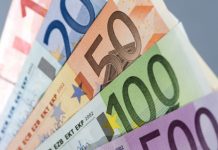The pound finished the previous week lower versus the euro. This was more to do with a rebound in demand for the euro, rather than any particular weakness in the pound. The pound euro exchange rate closed the previous week at €1.1180 for the pound.
| What do these figures mean? |
|---|
|
When measuring the value of a pair of currencies, one set equals 1 unit and the other shows the current equivalent. As the market moves, the amount will vary from minute to minute. For example, it could be written: 1 GBP = 1.13990 EUR Here, £1 is equivalent to approximately €1.14. This specifically measures the pound’s worth against the euro. If the euro amount increases in this pairing, it’s positive for the pound. Or, if you were looking at it the other way around: 1 EUR = 0.87271 GBP In this example, €1 is equivalent to approximately £0.87. This measures the euro’s worth versus the British pound. If the sterling number gets larger, it’s good news for the euro. |
Sterling has been broadly resilient against its major peers as investors remain hopeful that Brexit talks will advance as the deadline for next EU Summit nears. Reports suggest that UK Prime Minister Theresa May’s Brexit talks on Friday with EU officials went well. After May doubled her offer for the Brexit divorce bill to €40 billion, EU officials are saying that they could agree to move onto talks about a trade and transition deal next month. The EU divorce bill is the amount that the bloc wants UK to pay, to cover for the losses that Brexit might cause to the EU. These talks could help ensure a smooth Brexit, which would be beneficial for the pound.
| Why is a smooth Brexit good for the pound? |
|---|
| A smoother Brexit would be a scenario in which the economic consequences of leaving the European Union are minimised. This is favourable for the pound because the less the Brexit impact on the economy, the more likely that foreign investors will remain interested in the UK. Foreign investors need sterling to invest in the country and so the more GBP is purchased, the higher the demand and, thus, an increase in the currency’s value. |
However, political risk in Ireland could throw Brexit talks off course. The Irish Prime Minister Leo Varadkar is holding last minute talks to save his minority government, amid calls for him to step down over a police scandal. Irish political instability comes at a crucial point in Brexit talks, where the border between Ireland and Northern Ireland is key to Brexit negotiations advancing. Any political disruption in Ireland could derail progress and potentially prevent Brexit talks from advancing to trade deal and transition deal discussions. Therefore, the pound could be sensitive to developments in Ireland.
Will The Euro Continue To Benefit From A Weaker Dollar?
The euro has benefited from a weakening dollar in recent sessions. The euro often trades inversely to the dollar, so when demand for the dollar falls, which it has been, demand for the euro increases.
Euro strength has also been supported by strong data that continues to come out of the eurozone. On Friday, data from Germany, the powerhouse of Europe, showed that business leaders are the most confident since 1969, as the business climate index jumped from 116.7 to 117.5. These latest figures show that the German economy is set to power ahead with sentiment and consumer confidence at record highs.
| Why does strong economic data boost a country’s currency? |
|---|
| Solid economic indicators point to a strong economy. Strong economies have strong currencies because institutions look to invest in countries where growth prospects are high. These institutions require local currency to invest in the country, thus increasing demand and pushing up the money’s worth. So, when a country or region has good economic news, the value of the currency tends to rise. |
It is worth noting that the survey was carried out before the German coalition talks fell apart. However, the breakdown in coalition talks hasn’t sparked a huge reaction from the euro, suggesting that investors at this stage don’t appear to be overly concerned with the political situation in Germany.
Looking out across the week, Wednesday and Thursday look set to be the busiest days with eurozone sentiment indicators, German inflation numbers and eurozone inflation figures due to be released.
|
This article was initially published on TransferWise.com from the same author. The content at Currency Live is the sole opinion of the authors and in no way reflects the views of TransferWise Inc. |





